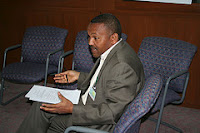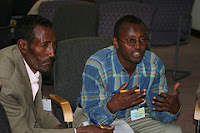-
PODCAST – Simulated Negotiations for Integrated Development in East Africa
›December 7, 2007 // By Geoffrey D. DabelkoI recently traveled to Ethiopia to attend “Population, Health, and Environment: Integrated Development for East Africa,” a conference sponsored by the Population Reference Bureau (PRB) and LEM Ethiopia. The conference was attended by more than 200 development practitioners from around the world, including many from Rwanda, Uganda, Tanzania, Kenya, and Ethiopia. For the meeting, I worked with my colleague Gib Clarke and Shewaye Deribe (pictured above) of the Ethio Wetlands and Natural Resources Association to write and conduct a role-playing simulation designed to bring to life the connections between population growth, natural resource management and environmental health, and development priorities. Participants worked with a scenario involving competing interests and rising tensions among a range of internal and external stakeholders in the fictional nation of Arborlind.
For the meeting, I worked with my colleague Gib Clarke and Shewaye Deribe (pictured above) of the Ethio Wetlands and Natural Resources Association to write and conduct a role-playing simulation designed to bring to life the connections between population growth, natural resource management and environmental health, and development priorities. Participants worked with a scenario involving competing interests and rising tensions among a range of internal and external stakeholders in the fictional nation of Arborlind.  Four teams representing government, civil society, a donor, and the private sector negotiated responses to short-term opportunities and long-term risks.
Four teams representing government, civil society, a donor, and the private sector negotiated responses to short-term opportunities and long-term risks.
This podcast gives you a taste of the trip–specifically the simulation. We begin and end the audio with the voices of local children welcoming some of us to their school at the Berga Wetland Project, an especially inspiring inauguration to a valuable conference. -
PODCAST – Demography, Environment, and Civil Strife
›October 30, 2007 // By Sean PeoplesOur notion of security has evolved in the years since September 11th, with increasing attention being given to understanding the underlying causes of conflict and state failure. Colin Kahl, an assistant professor in Georgetown University’s School of Foreign Service and a fellow at the Center for a New American Security, argues that these underlying causes of conflict can include—but are not limited to—demographic change, environmental degradation, and poverty.
Conflict is not sparked in a political or social vacuum, however; intervening variables such as political institutions and state capacity also influence the likelihood of violence. Kahl examines the interconnectedness of these pressures in the chapter he contributed to Too Poor for Peace? Global Poverty, Conflict, and Security in the 21st Century, which was published recently by The Brookings Institution. In the podcast below, he discusses the evolving concept of security and offers policy recommendations for building resilience to conflict in developing nations.
Click here for a summary of Kahl’s recent presentation at the Woodrow Wilson Center. -
PODCAST – Discussion with Military Expert on Environmental Security
›October 12, 2007 // By Geoffrey D. DabelkoAt a recent conference at the U.S. Army War College in Carlisle, PA, I had the chance to sit down with one of the most influential military voices on environmental security debates, Dr. Kent Hughes Butts. As both a professor of geography and a retired colonel in the U.S. Army, Dr. Butts has been at the center of the U.S. military’s efforts to grapple with the implications of environmental change. I asked Dr. Butts how he saw the field of environmental security (if we can call it a field) evolving over the last two decades.
-
PODCAST – PEPFAR Reauthorization and the Global AIDS Response
›September 26, 2007 // By Julie DohertyThe President’s Emergency Plan for AIDS Relief (PEPFAR), a $15 billion commitment, is set to expire at the end of fiscal year 2008. This critical boost in U.S. AIDS funding has helped millions of individuals infected with HIV, and in so doing, has improved developing nations’ health and education systems and decreased violence against women. In an original podcast by the Environmental Change and Security Program and the Global Health Initiative, UNAIDS Executive Director Dr. Peter Piot discusses how reauthorizing PEPFAR at increased levels of funding, expanding AIDS prevention programs, and coordinating global efforts to combat HIV/AIDS under U.S. leadership could amplify the effectiveness and sustainability of the global AIDS response.
Click here for the Wilson Center, “PEPFAR Reauthorization and the Global AIDS Response” event summary. -
PODCAST – Trade, Aid, and Security
›July 26, 2007 // By Sean PeoplesCurrent approaches to trade and aid often fail to stem poverty, promote stability, or prevent conflict in the developing world. According to Trade, Aid and Security: An agenda for peace and development, existing policies are poorly designed and benefit rich countries, denying developing nations access to vital financial markets. Lifting people out of poverty requires a secure environment and effective trade and aid policies can promote the preconditions for peace and stability. Oli Brown, a project manager and policy researcher at the International Institute for Sustainable Development and one of the editors of Trade, Aid and Security, discusses current development strategies and the conditions for wider political and economic stability.
-
PODCAST – Unleashing the Potential of Urban Growth
›July 10, 2007 // By Sean PeoplesNext year, for the first time in history, more than half of the world’s population will live in cities. This urban growth is inevitable, says a new United Nations Population Fund (UNFPA) report. Although cities are sometimes thought of as synonymous with poverty and large ecological footprints, the report, entitled State of World Population 2007: Unleashing the Potential of Urban Growth, describes the unprecedented urbanization as an opportunity. Lead author George Martine discusses the misconceptions surrounding urbanization and the ways in which policymakers can maximize the benefits of urban growth.
-
PODCAST – The Role of Gender in Population, Health, and Environment Programs
›June 21, 2007 // By Sean PeoplesGender is an oft-debated topic in the development community, usually focusing on ways to build equity and equality for women. So what are the appropriate roles of women and men? Who should take on responsibilities such as environmental management? What about family planning and reproductive health?
In the following podcast, experts Karen Hardee, senior adviser in reproductive health, HIV/AIDS, and monitoring and evaluation at John Snow, Inc.; and Elin Torell, coastal resources specialist at the University of Rhode Island’s Coastal Resources Center, address these questions, and specifically discuss the role of gender in field-based projects that incorporate population, health, and environment components.
Showing posts from category podcast.


 For the meeting, I worked with my colleague
For the meeting, I worked with my colleague  Four teams representing government, civil society, a donor, and the private sector negotiated responses to short-term opportunities and long-term risks.
Four teams representing government, civil society, a donor, and the private sector negotiated responses to short-term opportunities and long-term risks. 

